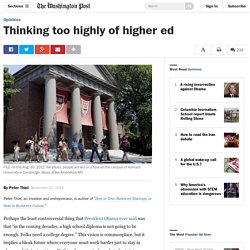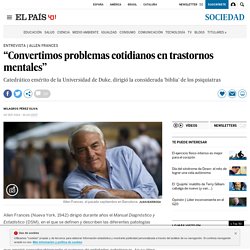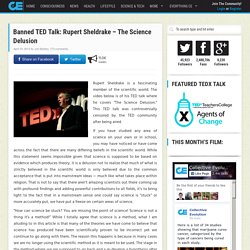

Storming Spain's Razor-Wire Fence: Europe Or Die (Episode 1/4) Thinking too highly of higher ed. FILE - In this Aug. 30, 2012, file photo, people are led on a tour on the campus of Harvard University in Cambridge, Mass.

(Elise Amendola/AP) By Peter Thiel November 21, 2014 Perhaps the least controversial thing that President Obama ever said was that “in the coming decades, a high school diploma is not going to be enough. Folks need a college degree.” This vision is commonplace, but it implies a bleak future where everyone must work harder just to stay in place, and it’s just not true. Is higher education an investment? Or is college mostly about consumption? But what if higher education is really just the final stage of a competitive tournament?
This tournament is obviously bad for the losers, who end up shut out of a self-satisfied “meritocratic” elite. Today that’s the tournament-style economy we have. Now education has taken the place of housing. Of course, you can’t become successful just by dropping out of college. Continue reading 10 minutes left. “Convertimos problemas cotidianos en trastornos mentales” Allen Frances (Nueva York, 1942) dirigió durante años el Manual Diagnóstico y Estadístico (DSM), en el que se definen y describen las diferentes patologías mentales.

Este manual, considerado la biblia de los psiquiatras, es revisado periódicamente para adaptarlo a los avances del conocimiento científico. El doctor Frances dirigió el equipo que redactó el DSM IV, a la que siguió una quinta revisión que amplió considerablemente el número de entidades patológicas. En su libro ¿Somos todos enfermos mentales? (Ariel, 2014) hace autocrítica y cuestiona que el considerado como principal referente académico de la psiquiatría colabore en la creciente medicalización de la vida. Pregunta. Respuesta. P. R. P. No supimos anticiparnos al poder de las farmacéuticas para crear nuevas enfermedades. Salvados - José Mujica aboga por el reparto de riqueza entre todos los ciudadanos. Christopher Ryan: Are we designed to be sexual omnivores?
Dave Meslin: The antidote to apathy. Supernormal Stimuli: Your Brain On Porn, Junk Food, and the Internet. Jon Ronson: Strange answers to the psychopath test. Bill Watterson: A cartoonist’s advice. Music and Life - Alan Watts. TEDxAsheville - Adam Baker - Sell your crap. Pay your debt. Do what you love. Self realization of life: Ven. Bhikkhu Sanghasena at TEDxLeh. Julian Assange speech that was censored by the Oxford Union. The Great Dictator. Bill Hicks. La Educación Prohibida. Banned TED Talk: Rupert Sheldrake – The Science Delusion.
Rupert Sheldrake is a fascinating member of the scientific world.

The video below is of his TED talk where he covers “The Science Delusion.” This TED talk was controversially censored by the TED community after being aired. If you have studied any area of science on your own or in school, you may have noticed or have come across the fact that there are many differing beliefs in the scientific world. While this statement seems impossible given that science is supposed to be based on evidence which produces theory, it is a delusion not to realize that much of what is strictly believed in the scientific world is only believed due to the common acceptance that is put into mainstream ideas — much like what takes place within religion.
“How can science be stuck? I have been researching many areas of science, world events, health etc. over the past 5.5 years. Rupert Sheldrake outlines 10 dogmas he has found to exist within mainstream science today. 1. Amanda Palmer: The art of asking. iO Tillett Wright: Fifty shades of gay.
Graham Hancock - The War on Consciousness @ TEDxWhitechapel.